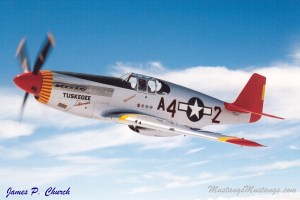
Historian doubts record of black pilots
Mon Dec 11, 3:14 PM ET
MONTGOMERY, Ala. - It has been part of the lore of America's first black fighter pilots since the end of World War II: The Tuskegee Airmen never lost a bomber to enemy fire.
But now, more than 60 years later, a leader of the group says he has uncovered records proving the claim is not accurate.
Air Force records show that at least a few bombers escorted by the red-tailed fighters of the Tuskegee Airman were shot down by enemy planes, William F. Holton, historian of Tuskegee Airmen Inc., said in an interview Monday with The Associated Press. And the group's losses may have been much greater, he said.
Holton's research was first reported Sunday by the Montgomery Advertiser.
Some surviving members of the group were offended by the findings of Holton and Daniel Haulman of the Air Force Historical Research Agency at Maxwell-Gunter Air Force Base in Montgomery, who came to the same conclusion.
Former Tuskegee Airman Carrol Woods of Montgomery called their claims "outrageous."
"I think they are trying to destroy our record. What's the point now?" Woods, 87, told the Advertiser.
Holton said his sole interest is in making sure the group's history is as accurate as possible.
The president of the Tuskegee Airmen Inc., retired Air Force Lt. Gen. Russell Davis, said he will no longer claim in speeches that the group never lost a bomber under its escort.
"I'm going to drop (it) until we can get this thing clarified," Davis said. "We've got some homework to do, obviously."
....................................
One mission report says that on July 26, 1944: "1 B-24 seen spiraling out of formation in T/A (target area) after attack by E/A (enemy aircraft). No chutes seen to open."
A second report, dated Aug. 31, 1944, praises group commander Gen. Benjamin O. Davis Jr. by saying he "so skillfully disposed his squadrons that in spite of the large number of enemy fighters, the bomber formation suffered only a few losses."
A third report says that on Sept. 12, 1944: "10 Me-109s attacked the rear of the bomber formation from below and left one B-17 burning, with 6 chutes seen to open."
Holton, of Columbia, Md., suspects that claims about the all-black group never losing a plane resulted from something that happened in May 1945 around the end of the war.
In a letter commending Davis, Col. Buck Taylor said the group had the distinction of never losing a bomber, Holton said. A military public relations representative included the claim in Davis' official biography, he said, and Davis later put it in his autobiography.
....................................
Holton said while the reports document a few bomber losses, far more planes may have been lost. The only way to determine the group's true record is to scour the post-mission reports of bomber groups that were escorted by the Airmen's P-51 fighters.
Alan Gropman, who teaches at the National Defense University in Washington, told the Advertiser that more research is needed, but added: "Even if they lost three or four bombers, it would still be minuscule compared to the losses incurred by white pilots who also escorted bombers."
In the end, even if they lost a few bombers, their air combat record placed it among the top fighter groups in the Army Air Force. While the fighter groups of the 8th Air Force still are renowned for their prowess, men like Bud Anderson, Robin Olds, Chuck Yeager, Frances Gabreski and Don Gentile, and the pilots of the 10th Air Force, Philip Cocheran are among the heroes of the WWII Air Force.
But the fighter groups of other air forces, the 7th, the 15th, remained obscured to most people but history buffs.
The story of the 332nd FG is a compelling one, given how reluctant the Air Force was to send them into combat, and kept them flying P-40's long after most other units had moved on.
It matters less that they may have lost a few bombers, and clearing up the record is important, than that the bomber groups which flew with them repeatedly requested their protection on their flights over Austria and Germany. That is their true legacy, at a time when black soldiers were thought to be mentally inferior, they fought as well and as hard as their white peers and gained the same amount of respect. Which was rare in 1940's America.
No comments:
Post a Comment